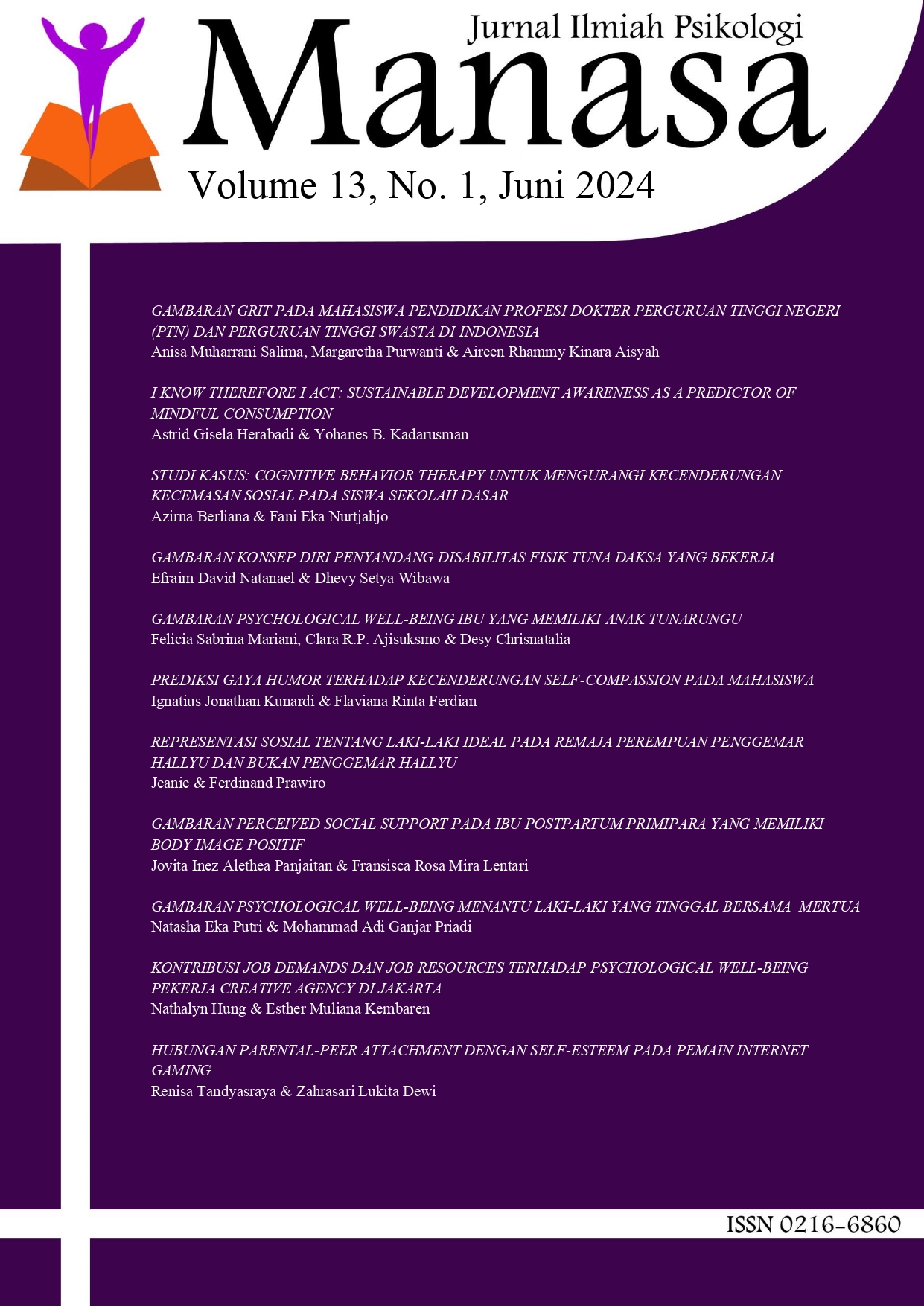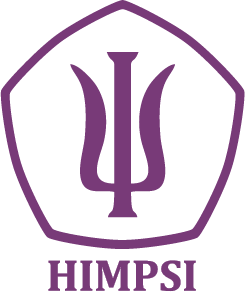PREDIKSI GAYA HUMOR TERHADAP KECENDERUNGAN SELF-COMPASSION PADA MAHASISWA
DOI:
https://doi.org/10.25170/manasa.v13i1.5388Keywords:
humor styles, self-compassion, college studentsAbstract
College students need effective coping strategies to optimize their performance and achieve their goals. One promising approach is self-compassion, which can help students navigate the challenges of college life. Self-compassion can be influenced by daily experiences, including humour style. Humour is often seen merely as a source of entertainment, but it can significantly impact self-compassion.
This study examines the relationship between different humour styles and self-compassion. A total of 245 college students from various universities across Indonesia participated, selected through a convenience sampling method. The Humour Style Questionnaire and the Skala Welas Diri were used to measure humour styles and self-compassion, respectively. To analyze how different humour styles predict self-compassion, multiple regression analysis with the enter procedure was employed.
The results showed that among the four humour styles (self-enhancing, affiliative, aggressive, and self-defeating), only self-enhancing, aggressive, and self-defeating humour significantly predicted self-compassion. Self-enhancing humour had the strongest predictive power, followed by aggressive humour and then self-defeating humour.
References
Arini, D. P. (2021). Emerging adulthood: Pengembangan teori Erikson mengenai teori psikososial pada abad 21. PSYCHE, 15(1), 11–20. https://doi.org/10.33557/jpsyche.v15i01.1377
Augesti, G., Lisiswanti, R., Saputra, O., & Nisa, K. (2015). Differences in stress level between first year and last year medical students in medical faculty of Lampung University. J MAJORITY, 4(4), 50–56. https://juke.kedokteran.unila.ac.id/index.php/majority/article/view/578
Azyz, A. N. M., Huda, M. Q., & Atmasari, L. (2019). School well-being dan kecemasan akademik pada mahasiswa. Journal of Psychology and Islamic Science, 3(1), 18–35. https://jurnal.iainkediri.ac.id/index.php/happiness/article/download/1884/905
Bartlett, J. E., Kotrlik, J. W., & Higgins, C. C. (2001). Organizational research: Determining appropriate sample size in survey research. Information Technology, Learning, and Performance Journal, 19(1), 43–50. https://www.opalco.com/wp-content/uploads/2014/10/Reading-Sample-Size1.pdf
Baş, Z., & Dilmaç, B. (2019). Predictive relationship between values, self-compassion and humor styles of adolescents. Research on Education and Psychology, 3(2), 80–90. https://dergipark.org.tr/en/pub/rep/issue/47401/551121
Cortina, J. M. (1993). What is coefficient alpha? An examination of theory and applications. Journal of Applied Psychology, 78(1), 98–104.
Coyle, E. F., Van Leer, E., Schroeder, K. M., & Fulcher, M. (2015). Planning to have it all: Emerging adults’ expectations of future work-family conflict. Sex Roles, 72(11–12), 547– 557. https://doi.org/10.1007/s11199-015-0492-y
Ewert, C., Vater, A., & Schröder-Abé, M. (2021). Self-compassion and coping: A meta-analysis. Mindfulness, 12, 1063–1077. https://doi.org/10.1007/s12671-020-01563-8/Published
Fauziah, A. A. (2015). Pengaruh humor style, self-esteem, dan religiusitas terhadap happiness penderita gagal ginjal kronis [Skripsi Sarjana, Universitas Islam Negeri Syarif Hidayatullah, Jakarta, Indonesia]. Institutional Repository UIN Syarif Hidayatullah Jakarta. http://repository.uinjkt.ac.id/dspace/handle/123456789/38349
Field, A. (2009). Discovering statistics using SPSS (3rd ed.). SAGE Publications.
Ghufron, M. A. (2018). Revolusi industri 4.0: Tantangan, peluang dan solusi bagi dunia pendidikan. http://www.proceeding.unindra.ac.id/index.php/dispanas2018/article/viewFile/73/45
Gibson, J. M. (2019). An introduction to the psychology of humor. Routledge.
Grosemans, I., Hannes, K., Neyens, J., & Kyndt, E. (2020). Emerging Adults Embarking on Their Careers: Job and Identity Explorations in the Transition to Work. Youth and Society, 52(5), 795–819. https://doi.org/10.1177/0044118X18772695
Heintz, S., & Ruch, W. (2018). Can self-defeating humor make you happy? Cognitive interviews reveal the adaptive side of the self-defeating humor style. Humor, 31(3), 451–472. https://doi.org/10.1515/humor-2017-0089
Kail, R. V., & Cavanaugh, J. C. (2019). Human development: A life-span view (8th ed.). Cengage Learning.
Kasih, A. P. (2021, November 9). 80 persen mahasiswa tidak bekerja sesuai jurusan kuliah. KOMPAS. https://www.kompas.com/edu/read/2021/11/09/095731171/80-persen-mahasiswa-tidak-bekerja-sesuai-jurusan-kuliah?page=all
Keszei, A. P., Novak, M., & Streiner, D. L. (2010). Introduction to health measurement scales. Journal of Psychosomatic Research, 68(4), 319–323. https://doi.org/10.1016/j.jpsychores.2010.01.006
Khramtsova, I. I., & Chuykova, T. S. (2016). Mindfulness and self-compassion as predictors of humor styles in US and Russia. Social Psychology and Society, 7(2). https://doi.org/10.17759/sps.2016070207
Lee, E., & Hannafin, M. J. (2016). A design framework for enhancing engagement in student-centered learning: own it, learn it, and share it. Educational Technology Research and Development, 64(4), 707–734. https://doi.org/10.1007/s11423-015-9422-5
Martin, R. A., & Ford, T. (2018). The psychology of humor: An integrative approach (2nd ed.). Academic Press.
Martin, R. A., Puhlik-Doris, P., Larsen, G., Gray, J., & Weir, K. (2003). Individual differences in uses of humor and their relation to psychological well-being: Development of the humor styles questionnaire. Journal of Research in Personality, 37, 48–75. https://doi.org/10.1016/S0092-6566(02)00534-2
Mathies, C., Chiew, T. M., & Kleinaltenkamp, M. (2016). The antecedents and consequences of humour for service: A review and directions for research. Journal of Service Theory and Practice, 26(2), 137–162. https://doi.org/10.1108/JSTP-09-2014-0187
Mulia, A. (2014). Humor dalam masyarakat Medan. Medan Makna, 12(2), 137–153. https://ojs.badanbahasa.kemdikbud.go.id/jurnal/index.php/medanmakna/article/view/1035
Neff, K. (2003). Self-compassion: An alternative conceptualization of a healthy attitude toward oneself. Self and Identity, 2(2), 85–101. https://doi.org/10.1080/15298860309032
Neff, K. (2015). Self-compassion: The proven power of being kind to yourself. HarperCollins.
Neff, K. D. (2003). The development and validation of a scale to measure self-compassion. Self and Identity, 2(3), 223–250. https://doi.org/10.1080/15298860309027
Neff, K. D. (2016). The self-compassion scale is a valid and theoretically coherent measure of self-compassion. Mindfulness, 7(1), 264–274. https://doi.org/10.1007/s12671-015-0479-3
Neff, K. D. (2023). Self-compassion: Theory, method, research, and intervention. https://doi.org/10.1146/annurev-psych-032420
Nugraha, A. (2019). Pentingnya pendidikan berkelanjutan di era revolusi industri 4.0. Majalah Ilmiah PELITA ILMU, 2(1), 26–37. https://doi.org/10.37849/mipi.v2i1.118
Özyeşil, Z., Engin Deniz, M., & Kesici, S. (2013). Mindfulness and five factor personality traits as predictors of humor. Studia Psychologica, 55(1), 33–45. https://doi.org/10.21909/sp.2013.01.619
Puspitasari, I., Purwasih, R., Nurjaman, A., Studi Pendidikan Matematika, P., & Siliwangi Bandung, S. (2017). Analisis hambatan belajar mahasiswa pada mata kuliah program linear. Jurnal Ilmiah Pendidikan Matematika), 6(1), 39–46. http://journal.unipma.ac.id/index.php/jipm
Qonita, I., Dahlan, T. H., & Damaianti, L. F. (2021). Stres akademik sebagai mediator kontribusi konsep diri akademik terhadap keterlibatan mahasiswa dalam perkuliahan daring. Persona: Jurnal Psikologi Indonesia, 10(1), 119–132. https://doi.org/10.30996/persona.v10i1.4531
Rohde, P., Lewinsohn, P. M., Klein, D. N., Seeley, J. R., & Gau, J. M. (2013). Key characteristics of major depressive disorder occurring in childhood, adolescence, emerging adulthood, and adulthood. Clinical Psychological Science, 1(1), 41–53. https://doi.org/10.1177/2167702612457599
Scheel, T., & Gockel, C. (2017). Humor at work in teams, leadership, negotiations, learning and health. SpringerBriefs in Psychology. https://doi.org/10.1007/978-3-319-65691-5_2
Sugianto, D., Suwartono, C., & Handayani Sutanto, S. (2020). Reliabilitas dan validitas self-compassion scale versi bahasa Indonesia. Jurnal Psikologi Ulayat, 7(2), 177–191. https://doi.org/10.24854/jpu02020-337
Suharsono, Y., & Anwar, Z. (2020). Analisis stres dan penyesuaian diri pada mahasiswa. Jurnal Online Psikologi, 8(1), 1–12. https://scholar.archive.org/work/ezhxwhdesngsfidave57s7oige/access/wayback/http://ejournal.umm.ac.id/index.php/cognicia/article/download/11527/pdf
Sultanoff, S. M. (2013). Integrating humor into psychotherapy: Research, and the necessary conditions for the presence of therapeutic humor in helping relationships. The Humanistic Psychologist, 41(4), 388–399. https://doi.org/10.1080/08873267.2013.796953
Taber, K. S. (2018). The use of Cronbach’s Alpha when developing and reporting research instruments in science education. Research in Science Education, 48(6), 1273–1296. https://doi.org/10.1007/s11165-016-9602-2
Tavakol, M., & Dennick, R. (2011). Making sense of Cronbach’s alpha. International Journal of Medical Education, 2, 53–55. https://doi.org/10.5116/ijme.4dfb.8dfd
Warrens, M. J. (2014). On Cronbach’s alpha as the mean of all possible k-split alphas. Advances in Statistics, 2014, 1–5. https://doi.org/10.1155/2014/742863
Yan, K., Analya, P., & Fun, L. F. (2021). Mindfulness, self-compassion, dan humor styles. Jurnal Ilmu Perilaku, 5(1), 39–56. https://doi.org/10.25077/jip.5.1.39-56.2021
Yue, X., Anna, M. L. H., & Hiranandani, N. A. (2017). How humor styles affect self-compassion and life satisfaction: A study in Hong Kong. Acta Psychopathologica, 3(4), 1–5. https://doi.org/10.4172/2469-6676.100113
Yue, X. D. (2011). The Chinese ambivalence to humor: Views from undergraduates in Hong Kong and China. Humor, 24(4), 463–480. https://doi.org/10.1515/HUMR.2011.026
Downloads
Published
Issue
Section
License
Copyright (c) 2024 MANASA

This work is licensed under a Creative Commons Attribution-NonCommercial-ShareAlike 4.0 International License.









.png)
.png)

